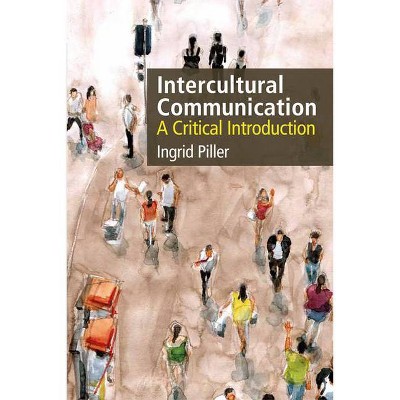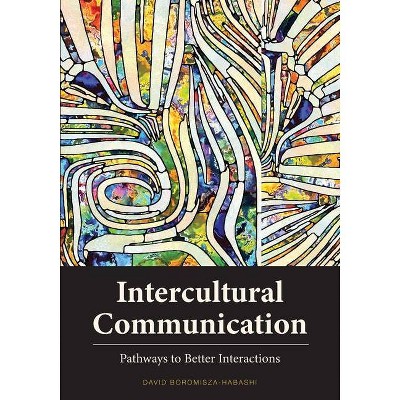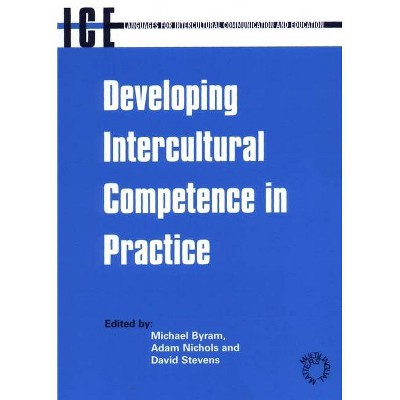Intercultural Communication - 2nd Edition by Ingrid Piller (Hardcover)

Similar Products
Products of same category from the store
AllProduct info
<p/><br></br><p><b> About the Book </b></p></br></br>Combining perspectives from discourse analysis and sociolinguistics, the second edition of this popular textbook provides students with an up-to-date overview of the field of intercultural communication.<p/><br></br><p><b> Book Synopsis </b></p></br></br>Combining perspectives from discourse analysis and sociolinguistics, the second edition of this popular textbook provides students with an up-to-date overview of the field of intercultural communication. Ingrid Piller explains communication in context using two main approaches. The first treats cultural identity, difference and similarity as discursive constructions. The second, informed by bilingualism studies, highlights the use and prestige of different languages and language varieties as well as the varying access that speakers have to them.<p/><br></br><p><b> From the Back Cover </b></p></br></br>APPROVED BY AUTHOR <p>Ingrid Piller's book will be seen as a landmark in a 'second wave' of studies on intercultural communication. Solidly grounded in discourse analysis and sociolinguistics, clearly and accessibly written and compellingly argued, it revives a field not always well served by its scholars, and we are now at last in a position to see intercultural communication for what it is: a historically situated and politically sensitive complex of communication modes, analysis of which requires attention to the smallest details as well as to the biggest things in the world - globalization processes.</p> <p>Jan Blommaert, Tilburg University</p> <p>Combining discourse analytic and sociolinguistic perspectives, this introduction provides students with a comprehensive, up-to-date and critical overview of the field of intercultural communication.</p><p>Ingrid Piller explains communication in context using two main approaches. The first treats cultural identity, difference and similarity as discursive constructions. The second, informed by bilingualism studies, highlights the use and prestige of different languages and language varieties as well as the varying access that speakers have to them.</p><p>Linguistics students will find this book a useful tool for studying language and globalization as well as applied linguistics.</p><p>Key features include: <ul><li>Case studies from around the world</li><li>Learning objectives, key points, exercises and suggestions for further reading in each chapter</li><li>Reader-friendly, accessible style</li></ul></p><p>Ingrid Piller is Professor of Applied Linguistics at Macquarie University, Sydney, Australia. She has published widely on the sociolinguistics of language learning, multilingualism and intercultural communication and blogs about her research at www.languageonthemove.org.<p/><br></br><p><b> Review Quotes </b></p></br></br><br><p>Ingrid Piller's book will be seen as a landmark in a 'second wave' of studies on intercultural communication. Solidly grounded in discourse analysis and sociolinguistics, clearly and accessibly written and compellingly argued, it revives a field not always well served by its scholars, and we are now at last in a position to see intercultural communication for what it is: a historically situated and politically sensitive complex of communication modes, analysis of which requires attention to the smallest details as well as to the biggest things in the world - globalization processes.</p>--Jan Blommaert, Tilburg University<br><br><p>One important feature of the book is the inclusion of case studies from around the world. The book consists of vivid and interesting cases of modernity that span the globe, suggesting that Piller's intercultural communication research derived from a worldwide cultural basis. In other words, every nation, due to its own unique culture, may contribute to issues and understanding of intercultural communication.<i></p></i>--Fei Cao, Hangzhou Normal University "Discourse Studies "<br><br><p>The key contribution of Ingrid Piller's book, in my view, is in the fact that it changes the terms of engagement in discussion of intercultural communication (IC), a subject that is commonly trivialized and oversimplified, and offers a much more nuanced and complex treatment of culture as an ideological construct, created and recreated through discursive practices, and of language as a commodity that could be marketed and sold. This added complexity does not result in a denser prose - Piller's treatment of the subject is engaging, lively and down-to-earth. <i></p></i>--Aneta Pavlenko, Temple University "UKLEF E-Seminar 2012 "<br><br><p>This is an excellent introduction and a very important contribution to the field. I have not found in other recent publications such extensive and wide-ranging examples of relevant research used to support the arguments put forward. </p>--Jane Woodin, University of Sheffield "International Journal of Applied Linguistics "<br><br>A number of features worthy of note in this book are as follows: first, the book is a rich source of authoritative references and profound comments from the relevant fields to make this into a solid springboard from which to start further explorations of intercultural communication.Second, the book is engaging to readers who are carried away by the book to such an extent that they cannot but feel themselves vicariously involved in the intercultural communication explored by the author, equipped with her rich experience, first-hand examples and insightful case analysis, and engrossed in the writing of the book with its readerfriendly language and style.Third, the book maintains a uniform and neat structure with each chapter consisting of its objectives, the specific issues to be discussed, the key points, further reading and activities. This outlay motivates the reader to dynamically engage in a dialogue with the author, which in a way best exemplifies the theme of the book.--Zhao Ming, Department of Economics of School of Management, China University of Mining and Technology "Discourse and Society "<br><p/><br></br><p><b> About the Author </b></p></br></br><p>Ingrid Piller is Professor of Applied Linguistics at Macquarie University, Sydney, Australia. She holds a PhD from the Technical University of Dresden, Germany, and has taught at universities in Australia, Europe, the Middle East and North America. She has published widely on the sociolinguistics of language learning, multilingualism and intercultural communication. She blogs about her research at www.languageonthemove.org<p>
Price History
Price Archive shows prices from various stores, lets you see history and find the cheapest. There is no actual sale on the website. For all support, inquiry and suggestion messages communication@pricearchive.us



















